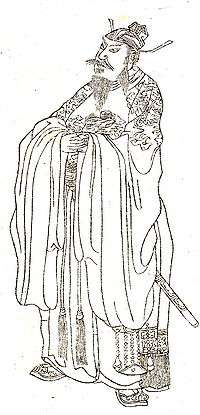Xu Da
| Xu Da | |
|---|---|
|
A portrait of Xu Da in a 1921 Chinese publication | |
| General of the Ming dynasty | |
| Born | 1332 |
| Died | 1385 (aged 52–53) |
| Names | |
| Traditional Chinese | 徐達 |
| Simplified Chinese | 徐达 |
| Pinyin | Xú Dá |
| Wade–Giles | Hsu Ta |
| Courtesy name | Tiande (Chinese: 天德; pinyin: Tiāndé; Wade–Giles: Tian-te) |
Xu Da (1332–1385), courtesy name Tiande, was a Chinese military general who lived in the late Yuan dynasty and early Ming dynasty. He was a friend of Zhu Yuanzhang (the Hongwu Emperor), the founder and first ruler of the Ming dynasty, and assisted him in overthrowing the Mongol-led Yuan dynasty and establishing the Ming dynasty. He was also the father of Empress Xu, who married the third Ming ruler, the Yongle Emperor.
Life
Xu joined the Red Turban rebels in 1353 to overthrow the Mongol-led Yuan dynasty in China. He served as a general under Zhu Yuanzhang, a prominent rebel leader, and assisted him in defeating other rival warlords and opposing forces. In 1369, two years after the Ming dynasty was founded, Xu Da and other Ming generals led an attack on Khanbaliq (modern Beijing), the Yuan capital, and forced the last Yuan ruler, Emperor Huizong, to flee northward.[1]
Xu Da led a pursuit on the retreating Yuan forces and encountered Yi Seonggye, the founder of the Korean Joseon dynasty, who was ordered by the Mongols to attack the Ming army. Xu Da's presence struck fear into the Korean generals, who in turn, allied themselves with the Ming forces instead. Afterwards, Xu Da's army entered Mongol territory, routed Mongol reinforcements, sacked the Mongol capital at Karakorum,[1] and captured thousands of Mongol nobles in 1370. His army ventured to Transbaikalia and reached further north than any other Chinese army had ever before.[1]
Xu Da died in 1385 under mysterious circumstances. He was not accused of plotting an assassination on the Hongwu Emperor – although many other generals who contributed heavily to the founding of the Ming dynasty were put to death by the emperor for allegedly plotting rebellions. According to legend, Xu Da was allergic to goose, so the Hongwu Emperor sent him a goose dish and ordered the emissary to ensure that Xu ate it and died.[2]
In fiction
Xu Da appears as a minor character in Louis Cha's wuxia novel The Heaven Sword and Dragon Saber. As a member of the anti-Yuan Ming Cult, Xu Da participated actively in the rebellions to overthrow the Yuan dynasty under the leadership of Zhang Wuji. Zhang passes Xu the Book of Wumu, a text on military strategy written by the Song dynasty general Yue Fei. Xu benefits greatly from reading the book, becomes a brilliant military commander, and assists Zhu Yuanzhang in overthrowing the Yuan dynasty and establishing the Ming dynasty.
References
- 1 2 3 "Xu Da." Encyclopædia Britannica. 2008. Encyclopædia Britannica Online. 09 Oct. 2008
- ↑ Deng, YinkeHistory of China Beijing : China Intercontinental Press, 2007. ISBN 978-7-5085-1098-9 pp.131-132
| Preceded by Li Shanchang |
Left Chancellor of Ming Dynasty 1371 |
Succeeded by Hu Weiyong |
| Preceded by none |
Right Chancellor of Ming Dynasty 1368 - 1371 |
Succeeded by Wang Guangyang |
